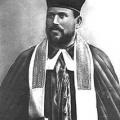 “Sirota was the greatest cantor in the world...” according to Alan Dershowitz. Although there may be a few who disagree with him, there is no question that Sirota’s name can be placed very high on the list of cantorial superstars of the last century. His remarkable voice, lyrical talent and fame often resulted in his being called the “Jewish Caruso.” This comparison to the legendary 20th century opera and recording star, Enrico Caruso, must be acknowledged as high praise indeed.
“Sirota was the greatest cantor in the world...” according to Alan Dershowitz. Although there may be a few who disagree with him, there is no question that Sirota’s name can be placed very high on the list of cantorial superstars of the last century. His remarkable voice, lyrical talent and fame often resulted in his being called the “Jewish Caruso.” This comparison to the legendary 20th century opera and recording star, Enrico Caruso, must be acknowledged as high praise indeed.
Sirota began his career as a cantor in Odessa. His strong and beautiful voice earned him a place in Vilna’s Shtatshul where he began his lengthy and successful collaboration with choirmaster Leo Lowe. In 1907 Sirota was invited to occupy the position of Obercantor (head cantor) at the Great Synagogue of Warsaw (Tlomacki) where he officiated for the next 19 years. During these years, services at the Tlomacki Synagogue became major musical events. Thousands of people wanted to hear the incredible voice of Cantor Sirota together with Leo Lowe’s music and choir.
As his fame spread, he traveled on concert tours all around Europe, and on February 14, 1912 he made his NYC debut at a fully-packed Carnegie Hall.
Although Cantor Sirota achieved great fame and prominence, he always remained a kind and generous man. Along with millions of others who lived in Warsaw at the outbreak of World War II, he was forced into the Warsaw ghetto. Yet, because of his wide-spread fame, he was given an opportunity few others had. He was given permission to leave by the Nazis.
It was a terrible choice, but in the end, this great man could not turn away from his family and his people. He chose to stay with those he loved. Sadly, he and his entire family perished during the 1943 uprising.
These recordings were produced prior to 1923 and are in the public domain.





























































































